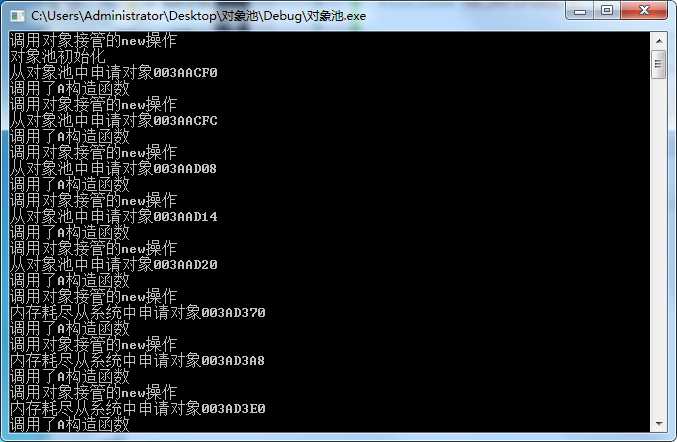C++对象池
时间:2020-07-24 21:56:01
收藏:0
阅读:75
前言
- 大量使用的对象,重复的创建和销毁,很耗费性能,这个时候就要使用对象池技术。当物体使用时,如果对象池中有,从对象池中取出使用,没有就创建,不使用时候,将物体放回对象池,改变状态就是新的对象。
- 常使用在飞机弹幕游戏中,玩家射击的时候,会创建很多子弹对象,当子弹对象碰到敌人时,会被销毁。不断的创建销毁对象时游戏帧数会下降,导致卡屏,所以可以使用对象池技术来解决。
- 对象池根据类型可变,必须使用模板来实现,这样就会达到我有什么样类型,就会有什么样的对象池。
效果和代码实现
- 下图是程序运行的效果:

ObjectPool.h
#pragma once
#ifndef __OBJECTPOOL_H__
#define __OBJECTPOOL_H__
#include<cassert>
#include<mutex>
#ifdef _DEBUG
#ifndef MyPrintf
#define MyPrintf(...) printf(__VA_ARGS__)
#endif
#else
#ifndef MyPrintf
#define MyPrintf(...)
#endif
#endif // !_Debug
template<typename T,size_t nPoolSize>
class ObjectPool
{
private:
struct ObjectNodeHeader
{
ObjectNodeHeader* pNext;
char nRef;
bool bPool;
};
public:
ObjectPool()
{
MyPrintf("对象池初始化\n");
_InitObjectPool();
}
~ObjectPool()
{
MyPrintf("对象池析构\n");
if (_pBuf != nullptr)
{
free(_pBuf);
}
_pBuf = nullptr;
}
//释放对象
void freeObject(void* pObject)
{
MyPrintf("释放对象%p\n", pObject);
//计算出对象所在的对象信息头部地址
ObjectNodeHeader* pObjNode = (ObjectNodeHeader*)((char*)pObject - sizeof(ObjectNodeHeader));
assert(1 == pObjNode->nRef);
pObjNode->nRef = 0;
if (pObjNode->bPool)
{
std::lock_guard<std::mutex> lock(_mutex);
pObjNode->pNext = _pHeader;
_pHeader = pObjNode;
}
else
{
//不在对象池
free(pObjNode);
}
}
//申请对象
void* allocObject(size_t size)
{
std::lock_guard<std::mutex> lock(_mutex);
ObjectNodeHeader* pReturn = nullptr;
if (nullptr == _pHeader)//内存耗尽
{
pReturn = (ObjectNodeHeader*)malloc(sizeof(T) + sizeof(ObjectNodeHeader));
pReturn->bPool = false;
pReturn->nRef = 1;
pReturn->pNext = nullptr;
MyPrintf("内存耗尽从系统中申请对象%p\n", ((char*)pReturn) + sizeof(ObjectNodeHeader));
}
else
{
pReturn = _pHeader;
_pHeader = _pHeader->pNext;
assert(0 == pReturn->nRef);
pReturn->nRef = 1;
MyPrintf("从对象池中申请对象%p\n", ((char*)pReturn) + sizeof(ObjectNodeHeader));
}
//跳过头部的信息的字节大小
return (char*)pReturn + sizeof(ObjectNodeHeader);
}
protected:
void _InitObjectPool()
{
assert(nullptr == _pBuf);
if (_pBuf) { return; }
//计算对象池的大小分配空间
size_t realsize = sizeof(ObjectNodeHeader) + sizeof(T);
size_t bufsize = nPoolSize * realsize;
_pBuf = (char*)malloc(bufsize);
//初始化对象节点数据
_pHeader = (ObjectNodeHeader*)_pBuf;
_pHeader->bPool = true;
_pHeader->nRef = 0;
_pHeader->pNext = nullptr;
//遍历链表结构初始化
ObjectNodeHeader* pPerNode = _pHeader;
for (size_t i = 1; i < nPoolSize; ++i)
{
ObjectNodeHeader* pCurNode = (ObjectNodeHeader*)(_pBuf + i * realsize);
pCurNode->bPool = true;
pCurNode->nRef = 0;
pCurNode->pNext = nullptr;
pPerNode->pNext = pCurNode;
pPerNode = pCurNode;
}
}
private:
ObjectNodeHeader* _pHeader;
char* _pBuf;
std::mutex _mutex;
};
//对象接口模板
template<typename T,rsize_t nPoolSize>
class PoolBaseObject
{
public:
void* operator new(size_t size)
{
MyPrintf("调用对象接管的new操作\n");
//从对象池申请
return _PoolInstance().allocObject(size);
}
void operator delete(void* p)
{
MyPrintf("调用对象接管的delete操作\n");
_PoolInstance().freeObject(p);
}
template<typename ...Args>
static T* createObject(Args ... args)
{
//这里做一些不方便在构造函数中做的事
T* obj = new T(args...);
return obj;
}
static void destroyObject(T* pobject)
{
delete pobject;
}
private:
static ObjectPool<T, nPoolSize>&_PoolInstance()
{
static ObjectPool< T, nPoolSize>selfPoolInstance;
return selfPoolInstance;
}
};
#endif // !__OBJECTPOOL_H__
额外补充
int arr[10] = { 1,2,3,4,5,6,7,8,9,10 };
for (int& a:arr)
{
a = 666;
}
// for (int i = 0; i < 10; i++)
// {
// int& a = arr[i];
// a = 666;
// }
for (int a:arr)
{
cout << a << " ";
}
cout << endl;
//取里面的值不加引用,但要改值要加引用
- 空类大小是1字节,需要站位。
- 顺序是new->构造->析构->delete
- foreach是只读循环
- for (int a:arr)这种遍历更香 ~!!
评论(0)
